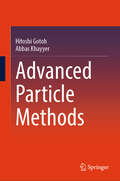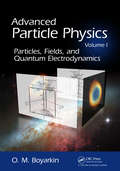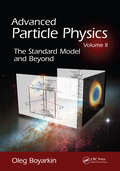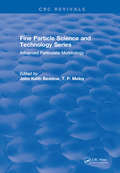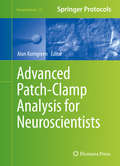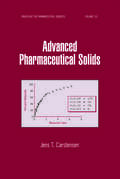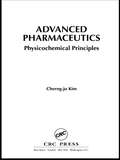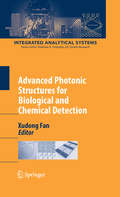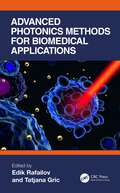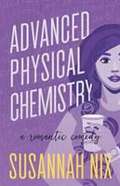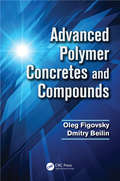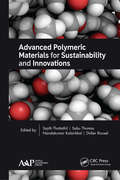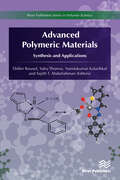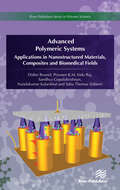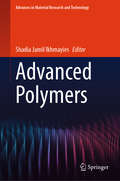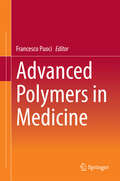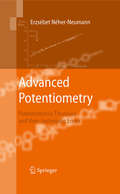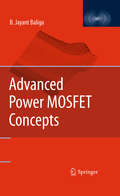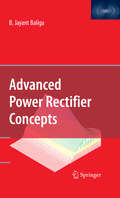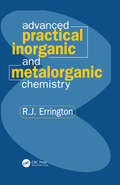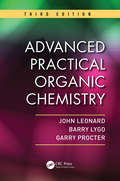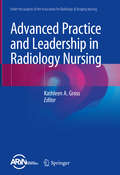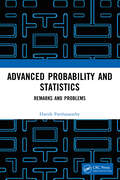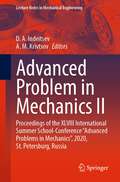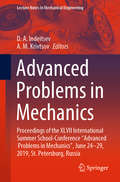- Table View
- List View
Advanced Particle Methods
by Hitoshi Gotoh Abbas KhayyerThis book provides an in-depth, comprehensive, and comprehensible description of the theoretical background and numerical methodologies corresponding to advanced particle methods formulated in classical Newtonian mechanics for simulation of fluids, structures, and their interactions. Particle methods are regarded as new-generation computational technology with a broad range of applications in engineering and science. Advanced particle methods refer to the latest developed particle methods with high stability, accuracy, conservation, and convergence properties. Distinctively, the described advanced particle methods are characterized by a clear, consistent mathematical–physical background, the absence of artificial numerical stabilizers that often require parameter tuning, rigorous satisfaction of boundary conditions, and excellent numerical results that have been extensively and scrupulously verified with respect to reliable analytical and experimental reference solutions. This book presents a unified description for both smoothed particle hydrodynamics (SPH) and moving particle semi-implicit (MPS) methods through a coherent presentation of fundamental equations, and numerical algorithms and schemes. Special attention is devoted to meticulous and coherent explanation of the advanced particle methods such that even undergraduate students can follow the derivation process and thoroughly understand the concepts and equations. The state-of-the-art particle method technology is also portrayed with the presentation of developed multi-physics, multi-scale particle methods corresponding to multi-phase flows, and hydroelastic fluid–structure interactions with rigorous treatment of interfacial moving boundaries.
Advanced Particle Physics Volume I: Particles, Fields, and Quantum Electrodynamics
by Oleg BoyarkinHelping readers understand the complicated laws of nature, Advanced Particle Physics Volume I: Particles, Fields, and Quantum Electrodynamics explains the calculations, experimental procedures, and measuring methods of particle physics. It also describes modern physics devices, including accelerators, elementary particle detectors, and neutrino tel
Advanced Particle Physics Volume II: The Standard Model and Beyond
by Oleg BoyarkinHelping readers understand the complicated laws of nature, Advanced Particle Physics Volume II: The Standard Model and Beyond explains the calculations, experimental procedures, and measuring methods of particle physics, particularly quantum chromodynamics (QCD). It also discusses extensions to the Standard Model and the physics of massive neutrino
Advanced Particulate Morphology
by John Keith BeddowThis volume, based on the 1977 NSF Residential Advanced Particle Morphology Workshop, covers the principle developments in this new and rapidly evolving field. The divergent fields of interst of the authors reflect the prosepcts for the wide application of particle morphology analysis and include: many branches of science and engineering concerned with fine particles, information processing, life sciences, pharmacy, and food technology.
Advanced Patch-Clamp Analysis for Neuroscientists (Neuromethods #113)
by Alon KorngreenThis volume presents current adaptations of the patch-clamp technique to neuroscience. Chapters focus on in-vivo recordings, voltage-gated channel recording and analysis, dendritic and axonal recordings, synaptic current recording and analysis, advanced fluorescent techniques, optogenetics and voltage-sensitive dye imaging, and finally channel and neuronal modeling. Written for the popular Neuromethods series, chapters include the kind of detail and key implementation advice that ensures successful results in the laboratory. Authoritative and practical, Advanced Patch-Clamp Analysis for Neuroscientists aims to ensure successful results in the further study of this vital field.
Advanced Pharmaceutical Solids (Drugs and the Pharmaceutical Sciences)
by Jens T. CarstensenThis extensive reference/text explores the principles, instrumentation, processes, and programs of pharmaceutical solid science as well as new aspects on one-component systems, micromeritics, polymorphism, solid-state stability, cohesion, powder flow, blending, single- unit sustained release, and tablet coating.Reveals unique approaches in phar
Advanced Pharmaceutics: Physicochemical Principles
by Cherng-ju KimDiscussing a comprehensive range of topics, Advanced Pharmaceutics: Physicochemical Principles reviews all aspects of physical pharmacy. The book explains the basic, mechanistic, and quantitative interpretation skills needed to solve physical pharmacy related problems. The author supplies a strong fundamental background and extensively covers therm
Advanced Photonic Structures for Biological and Chemical Detection (Integrated Analytical Systems)
by Xudong FanThis book is a part of Books Series on Integrated Microanalytical Systems. It discusses the latest applications of photonic technologies in bio-chemical sensing. Based on the photonic structures, the book is divided into four sections: Photonic crystal structures; Optical microring resonator structures; Optical fiber/waveguide structures; and, Miscellaneous or hybrid structures.
Advanced Photonics Methods for Biomedical Applications
by Tatjana Gric Edik RafailovAdvanced photonics methods for biomedical applications give researchers in universities and industries, and clinicians an overview of the novel tools for cancer diagnostics and treatment. This book provides researchers and professionals in the area of biomedical photonics with a toolbox of novel methodologies for biomedical applications, including health diagnostics, cancer detection, and treatment. It covers the theory, modeling, and design of each method, alongside their applications, fabrication, characterization, and measurements in clinical practice. A wide scope of concepts concerning innovative science and technologies of medicine will be covered, providing the readers with the latest research, developments, and technologies. It will also be a valuable resource for students and early-career researchers, alongside those involved in the design of the novel photonics-based techniques for health diagnostics and cancer detection and treatment. Key features • Discusses novel methods of cancer diagnostics and cancer treatment. • Details non and minimally invasive photonics techniques. • Explores the applications of machine learning and artificial intelligence to these novel techniques.
Advanced Physical Chemistry: A Romantic Comedy
by Susannah Nix<p>After four lousy boyfriends in a row, chemical engineer Penny Popplestone swears off men until she can figure out why they keep cheating on her. But her no-men resolution hits a snag when the mysterious and superhumanly hot barista at her favorite coffee shop strikes up a friendship with her. <p>Penny strives to keep things platonic, but when Caleb gives her the kiss of her life, she realizes he wants to be more than just friends. Tired of always being "good little Penny," she throws caution to the wind and pursues a no-strings fling with the hottie barista. It's not like they have anything in common beyond scorching physical chemistry, so what does she have to lose? <p>Only her heart. <p>Now, this fanfic-reading, plus-size heroine faces an unsolvable problem. What do you do when being apart is unbearable...but being together is impossible? <p>Advanced Physical Chemistry is the third in a series of standalone rom-coms featuring geeky heroines who work in STEM fields.</p>
Advanced Polymer Concretes and Compounds
by Oleg Figovsky Dmitry BeilinOne way of improving performance attributes of building structures is to use a new class of materials-polymer composites. They have unique properties that combine high strength with features of non-metallic materials. Polymer concretes (PC) appear to offer many possibilities for producing new materials with desired physical and mechanical character
Advanced Polymeric Materials for Sustainability and Innovations
by Sabu Thomas Sajith Thottathil Nandakumar Kalarikkal Didier RouxelThis informative volume discusses recent advancements in the research and development in synthesis, characterization, processing, morphology, structure, and properties of advanced polymeric materials. With contributions from leading international researchers and professors in academic, government and industrial institutions, Advanced Polymeric Materials for Sustainability and Innovations has a special focus on eco-friendly polymers, polymer composites, nanocomposites, and blends and materials for traditional and renewable energy. In this book the relationship between processing-morphology-property applications of polymeric materials is well established. Recent advances in the synthesis of new functional monomers has shown strong potential in generating better property polymers from renewable resources. Fundamental advances in the field of nanocomposite blends and nanostructured polymeric materials in automotive, civil, biomedical and packaging/coating applications are the highlights of this book.
Advanced Polymeric Materials: Synthesis, Properties, And Advanced Applications
by Sabu Thomas Nandakumar Kalarikkal Didier Rouxel Sajith T. AbdulrahmanRecent advances in polymer research has led to the generation of high quality materials for various applications in day to day life. The synthesis of new functional monomers has shown strong potential in generating novel polymer materials, with improved properties.Advanced Polymeric Materials includes fundamentals and numerous examples of polymer blend preparation and characterizations. Developments in blends, polymer nanocomposites and its various characterization techniques are highlighted in the book.
Advanced Polymeric Systems: Applications in nanostructured materials, composites and biomedical fields (River Publishers Series In Polymer Science Is A Series Of Comprehensive Academic And Professional Books Which Focus On Theory And Applications Of Polymer Science. Polymer Science, Or Macromolecular Science, Is A Subfield Of Materials Science Concerned With Polymers, Primarily Synthetic Polymers Such As Plastics And Elastomers. The Field Of Polymer Science Includes Researchers In Multiple Disciplin)
by Sabu Thomas Nandakumar Kalarikkal Didier Rouxel K. M. Praveen Indu Raj Sandhya GopalakrishnanOver recent years a considerable amount of effort has been devoted, both in industry and academia, towards the incorporation of various macro, micro and nano sized fillers into polymers. There is also much interest in the evaluation of various polymer properties with respect to a wide set of applications. The advances in nanotechnology together with the development in material sciences has improved the shortcomings of these materials over the decade. This book covers the latest advances in the field of polymer nanocomposites and polymer composites for varied applications. The major topics discussed in the book include: • Nanostructured materials for energy applications • Nanostructured polymercomposites • Bio-polymers • Nanostructured polymers for biomedical applicationsThe book contains extended and updated research papers that were initially selected for the ICAMP-2017 conference which focused on advances in polymer materials.The book is ideal for researchers and practitioners in polymer science and materials science as well as for graduate students in polymer chemistry, materials science, nanotechnology and biomedical engineering.
Advanced Polymers (Advances in Material Research and Technology)
by Shadia Jamil IkhmayiesThis book delves into a wide array of polymer topics, covering synthesis methods, processing technologies, performances, advanced characterization, and modeling techniques. It highlights recent advancements in polybenzoxazine-based smart shape memory materials, metallopolymer, HCN derived polymers. Advanced polymer composites, polymeric nanomaterials, and their fabrication methods and applications are also discussed. Additionally, the book explores the utilization of emerging polymer materials in biosensor development, covering various classes such as biopolymers, functional polymers, hydrogels, conductive polymers, and nanomaterials. It provides insights into the recent advances in polyaniline copolymers for chemical sensors and cellulose nanocrystals (CNC) and cellulose nanofibers (CNF)-based pickering emulsions with antimicrobial properties, particularly focusing on applications in food and biomedical products. Furthermore, it delves into polydisperse polymer brushes under compression, detailing their behavior concerning polymer persistence length and substrate stiffness.
Advanced Polymers in Medicine
by Francesco PuociThe book provides an up-to-date overview of the diverse medical applications of advanced polymers. The book opens by presenting important background information on polymer chemistry and physicochemical characterization of polymers. This serves as essential scientific support for the subsequent chapters, each of which is devoted to the applications of polymers in a particular medical specialty. The coverage is broad, encompassing orthopedics, ophthalmology, tissue engineering, surgery, dentistry, oncology, drug delivery, nephrology, wound dressing and healing, and cardiology. The development of polymers that enhance the biocompatibility of blood-contacting medical devices and the incorporation of polymers within biosensors are also addressed. This book is an excellent guide to the recent advances in polymeric biomaterials and bridges the gap between the research literature and standard textbooks on the applications of polymers in medicine.
Advanced Potentiometry: Potentiometric Titrations and Their Systematic Errors
by Erzsébet Néher-Neumann"Advanced Potentiometry" details the accurate calculation of potentiometric titrations. Additional terms such as the ideal diffusion potential together with the contribution of activity factors furnish calculated stability constants which do not include systematic errors and thus present a complete and correct description of equilibrium processes. Moreover, serious systematic errors resulting from the recent use of curve-fitting computer programs are highlighted later in the text. "Advanced Potentiometry" can advantageously be used by lecturers, researchers, PhD graduates and undergraduate students working in the fields of Solution Chemistry, Physical Chemistry, Inorganic Chemistry and Analytical Chemistry and Environmental Research.
Advanced Power MOSFET Concepts
by B. Jayant BaligaDuring the last decade many new concepts have been proposed for improving the performance of power MOSFETs. The results of this research are dispersed in the technical literature among journal articles and abstracts of conferences. Consequently, the information is not readily available to researchers and practicing engineers in the power device community. There is no cohesive treatment of the ideas to provide an assessment of the relative merits of the ideas. "Advanced Power MOSFET Concepts" provides an in-depth treatment of the physics of operation of advanced power MOSFETs. Analytical models for explaining the operation of all the advanced power MOSFETs will be developed. The results of numerical simulations will be provided to give additional insight into the device physics and validate the analytical models. The results of two-dimensional simulations will be provided to corroborate the analytical models and give greater insight into the device operation.
Advanced Power Rectifier Concepts
by B. Jayant BaligaDuring the last decade, many new concepts have been proposed for improving the performance of power rectifiers and transistors. The results of this research are dispersed in the technical literature among journal articles and abstracts of conferences. Consequently, the information is not readily available to researchers and practicing engineers in the power device community. There is no cohesive treatment of the ideas to provide an assessment of the relative merits of the ideas. Advanced Power Rectifier Concepts provides an in-depth treatment of the physics of operation of advanced power rectifiers. Analytical models for explaining the operation of all the advanced power rectifier devices will be developed. The results off numerical simulations will be provided to provide additional insight into the device physics and validate the analytical models. The results of two-dimensional simulations will be provided to corroborate the analytical models and provide greater insight into the device operation.
Advanced Practical Inorganic and Metalorganic Chemistry
by R. John ErringtonWhile the boundaries between the areas of chemistry traditionally labeled as inorganic, organic and physical are gradually diffusing, the practical techniques adopted by workers in each of these areas are often radically different. The breadth and variety of research classed as "inorganic chemistry" is readily apparent from an inspection of some of the leading international journals, and can be quite daunting for newcomers to this domain who are likely to have only limited experience of the methodologies involved. This book has therefore been written to provide guidance for those unfamiliar with the techniques most often encountered in synthetic inorganic / metalorganic chemistry, with an emphasis on procedures for handling air-sensitive compounds. One chapter is devoted to more specialized techniques such as metal vapor synthesis, and a review of preparative methods for a selection of starting materials is included as an aid to those planning research projects.While this book is aimed primarily at postgraduate and advanced undergraduate students involved in inorganic research projects, synthetic organic chemists and industrial chemists will also find much useful information within its pages. Similarly, it serves as a useful reference source for materials and polymer scientists who wish to take advantage of recent progress in precursor synthesis and catalyst development.
Advanced Practical Organic Chemistry
by John Leonard Barry Lygo Garry ProcterAny research that uses new organic chemicals, or ones that are not commercially available, will at some time require the synthesis of such compounds. Therefore, organic synthesis is important in many areas of both applied and academic research, from chemistry to biology, biochemistry, and materials science. The third edition of a bestseller, Advanc
Advanced Practice and Leadership in Radiology Nursing
by Kathleen A. GrossEndorsed by the Association of Radiologic and Imaging Nursing (ARIN), this first of a kind comprehensive radiology nursing textbook fills a gap by addressing important subjects for patient care and professional issues, as well as, future possibilities affecting nursing practice. It serves as a resource to related nursing specialties, e.g. critical care, emergency or peri-anesthesia, and to radiologic technologists and physician assistants. The book could be used as one resource for studying for radiologic nursing certification.The textbook is subdivided into five sections that address advanced practice and leadership roles, clinical patient care topics, safety topics, including legal considerations, e.g. infection prevention and equipment. It includes a section with topics impacting the patient experience and a section on professional topics, e.g. cybersecurity, social media, research/outcomes, interprofessional collaboration, workplace violence and current trends in imaging. The authors include advanced practice providers, radiology nurse managers, educators, physicians, a physicist, a dentist, attorneys, a child life specialist, administrators and a social worker.Radiology diagnostic examinations and therapeutic procedures have become a more prominent part of patient care due to advances in technology and the ability of radiology to provide services that were traditionally done in surgery or not done because of limited knowledge. Many procedures are facilitated by the radiology nurse from initial consult to transfer to a hospital unit or discharge and follow-up. Nurses assess, monitor, administer sedation/other medications and respond to emergencies. They serve as educators, researchers, and resource personnel to the radiology department and in many instances, to the entire facility. Radiology nurses are real leaders. In order to keep up-to-date on new developments, nurses need new literature to support their clinical expertise and leadership. This book is an unparalleled resource, written by experts in their areas of interest.
Advanced Probability and Statistics: Remarks and Problems
by Harish ParthasarathyThe chapters in this book deal with: Basic formulation of waveguide cavity resonator equations especially when the cross sections of the guides and resonators have arbitrary shapes. The focus is on expressing the total field energy within such a cavity resonator as a quadratic form in the complex coefficients that determine the modal expansions of the electromagnetic field. The reviews of basic statistical signal processing covering linear models, fast algorithms for estimating the parameters in such linear models, applications of group representation theory to image processing problems especially the representations of the permutation groups and induced representation theory applied to image processing problems involving the three dimensional Euclidean motion group. The Hartree-Fock equations for approximately solving the two electron atomic problem taking spin-orbit magnetic field interactions into account has been discussed. In the limit as the lattice tends to a continuum, the convergence of the stochastic differential equations governing interacting particles on the lattice to a hydrodynamic scaling limit. It will be useful to undergraduate and postgraduate students with courses on transmission lines and waveguides, and statistical signal processing. Print edition not for sale in South Asia (India, Sri Lanka, Nepal, Bangladesh, Pakistan or Bhutan).
Advanced Problem in Mechanics II: Proceedings of the XLVIII International Summer School-Conference “Advanced Problems in Mechanics”, 2020, St. Petersburg, Russia (Lecture Notes in Mechanical Engineering)
by D. A. Indeitsev A. M. KrivtsovThis book focuses on original theories and approaches in the field of mechanics. It reports on both theoretical and applied researches, with a special emphasis on problems and solutions at the interfaces of mechanics and other research areas. The respective chapters highlight cutting-edge works fostering development in fields such as micro- and nanomechanics, material science, physics of solid states, molecular physics, astrophysics, and many others. Special attention has been given to outstanding research conducted by young scientists from all over the world. This book is based on the 48th edition of the international conference “Advanced Problems in Mechanics”, which was held in 2020, in St. Petersburg, Russia, and co-organized by The Peter the Great St. Petersburg Polytechnic University and the Institute for Problems in Mechanical Engineering of the Russian Academy of Sciences, under the patronage of the Russian Academy of Sciences. It provides researchers and graduate students with an extensive overview of the latest research and a source of inspiration for future developments and collaborations in mechanics and related fields.
Advanced Problems in Mechanics: Proceedings of the XLVII International Summer School-Conference “Advanced Problems in Mechanics”, June 24-29, 2019, St. Petersburg, Russia (Lecture Notes in Mechanical Engineering)
by D. A. Indeitsev A. M. KrivtsovThis book focuses on original theories and approaches in the field of mechanics. It reports on both theoretical and applied research, with a special emphasis on problems and solutions at the interfaces of mechanics and other research areas. The respective chapters highlight cutting-edge works fostering development in fields such as micro- and nanomechanics, material science, physics of solid states, molecular physics, astrophysics, and many others. Special attention has been given to outstanding research conducted by young scientists from all over the world. Based on the 47th edition of the international conference “Advanced Problems in Mechanics”, held on June 24–29, 2019, in St. Petersburg, Russia, and organized by Peter the Great St. Petersburg Polytechnic University and Institute for Problems in Mechanical Engineering of Russian Academy of Sciences under the patronage of Russian Academy of Sciences, the book provides researchers and graduate students with an extensive overview of the latest research and a source of inspiration for future developments in various fields of mechanics.
